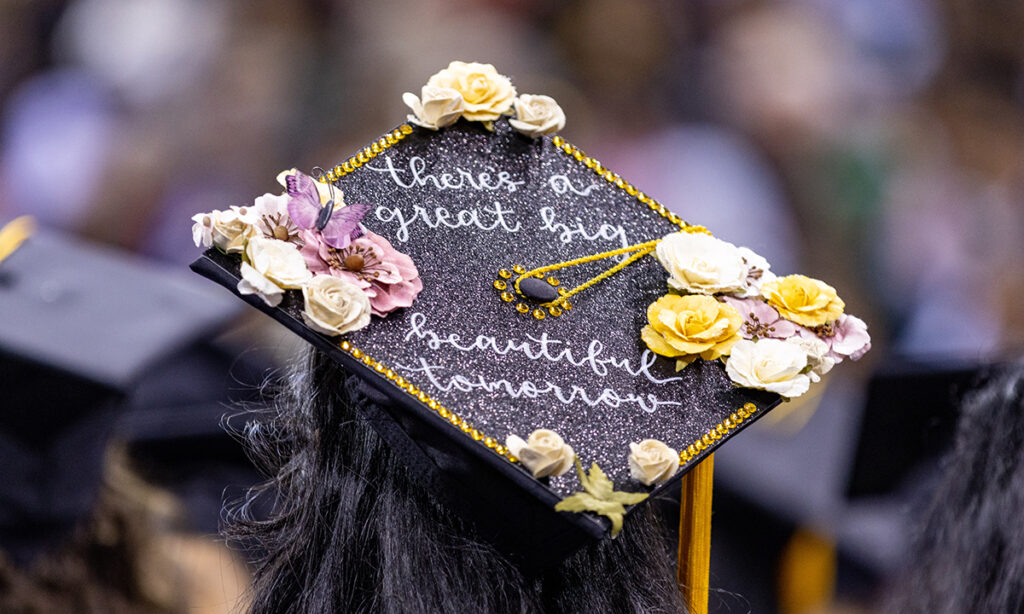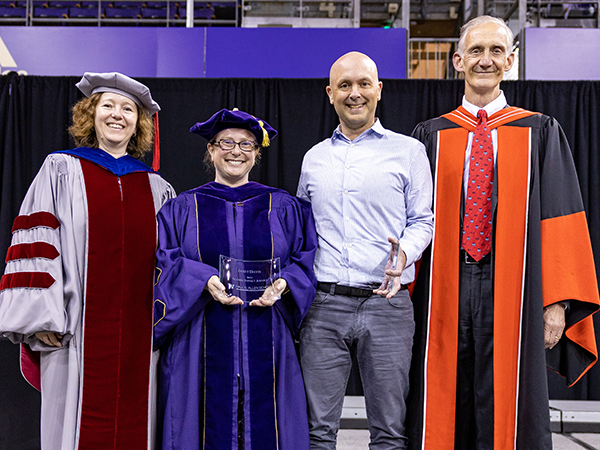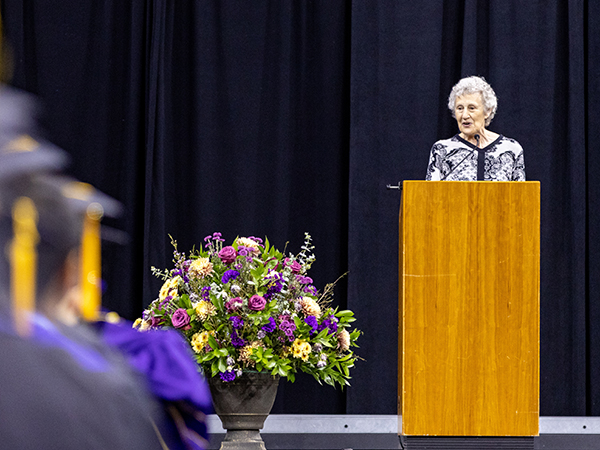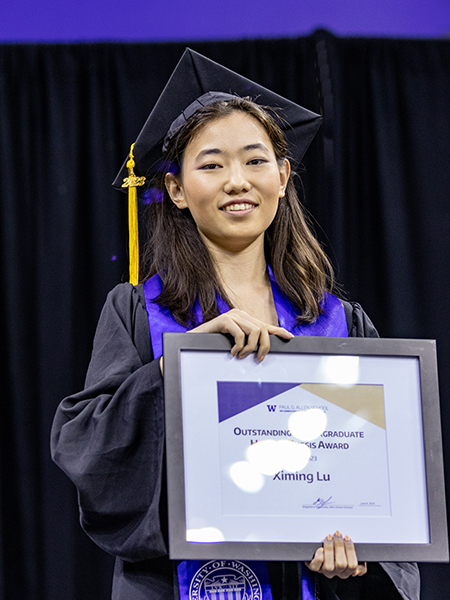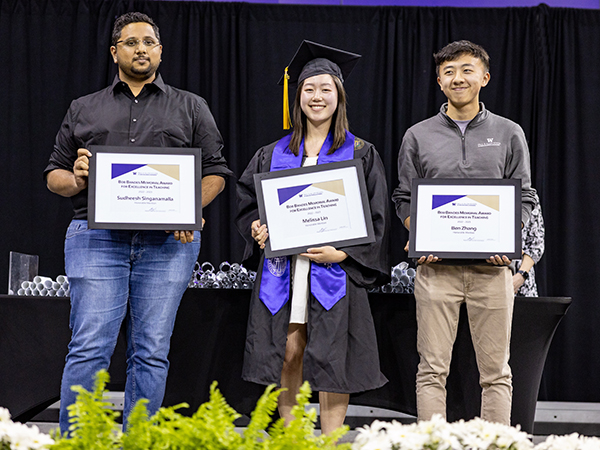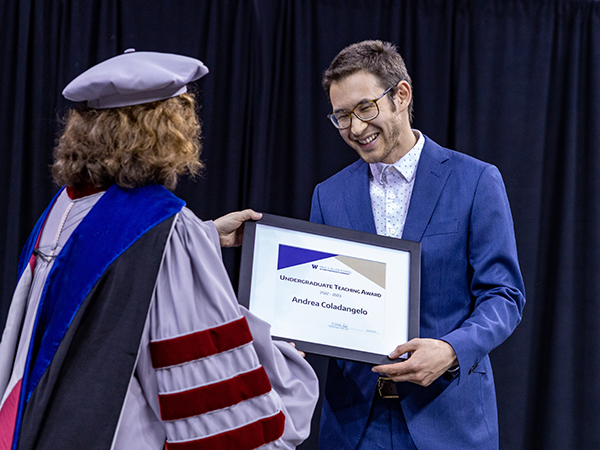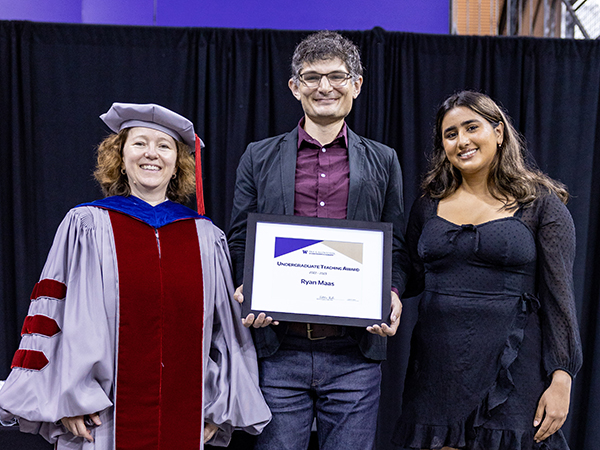On Friday, June 9, more than 4,000 family and friends from near and far gathered on the University of Washington campus to celebrate the Allen School’s 2023 graduates. The celebration commenced with a casual open house and meet-and-greet with faculty and staff in the Paul G. Allen Center and Bill & Melinda Gates Center. It culminated in a formal event in the Hec Edmundson Pavilion at the Alaskan Airlines Arena, where graduates made the brief journey across the stage to mark the start of a new journey as Allen School alumni.
‘Remember tonight‘
In her remarks opening the evening’s program, Magdalena Balazinska, professor and director of the Allen School, observed that most of those seated before her in their caps and gowns started their Allen School education prior to the COVID-19 pandemic. Balazinska congratulated them for overcoming the challenges and isolation of the intervening years to emerge victorious. She also noted that, while this milestone is cause for celebration, still more challenges — as well as opportunities — await them. And they should fear neither.
“When opportunities arise, take them. If you hesitate because opportunities are often scary and they often look like a lot of work, remember tonight. Remember how loud your families, your friends, the faculty, the staff have cheered for you, how much they believe in you, and take the opportunity,” Balazinska advised them. “Like generations that preceded you, you will face personal challenges, and the world around you will face challenges. Remember: you have a very strong education. Use that education, your passion, your kindness, your cleverness to have an impact on the people and the world around you.”
Recognizing the impact of those who came before
As if to illustrate the point, the Allen School welcomed back two graduates who have applied their education, along with their passion, kindness and cleverness, in very different ways: 2023 Alumni Impact Award recipients Janet Davis (Ph.D., ‘06) and Paul Mikesell (B.S., ‘96).
Allen School professor and Bill & Melinda Gates Chair Emeritus Ed Lazowska noted that the award is not only intended to honor outstanding alumni for their contributions throughout their careers, but also to remind the new graduates that they are joining a long and distinguished line of former Allen School students who have built on their education to change the world. Davis’ contributions include building Whitman College’s computer science program from the ground up to reflect that institution’s liberal arts traditions. Mikesell helped build scalable data storage company Isilon Systems into a multi-billion dollar company before expanding into agricultural technology by founding Carbon Robotics, a Seattle-based startup whose LaserWeeder provides farmers with a cost-effective, environmentally friendly alternative to pesticides.
‘Take advantage of the doors that open’
This year’s graduation speaker, Barbara Liskov, traveled from Boston to share her wisdom and encouragement with the newly minted graduates. Liskov is an Institute Professor of MIT — the highest institutional honor bestowed upon faculty — and received the A.M. Turing Award from the Association of Computing Machinery for her contributions to the theory and practice of programming language and systems design. She is also, as Lazowska noted in welcoming her to the stage, ”a wonderful human being — an example of what we should all strive to be.”
Before she touched down in Seattle, Liskov was asked what message she hoped the newly minted graduates would take away from their big day.
“One thing that strikes me when I look back on my career is the importance of the unexpected,” Liskov explained. “Doors close and doors open. It’s important in your career not to be discouraged when doors close and to take advantage of the doors that open. You may end up doing something quite different from where you started, and this is absolutely ok.”
Liskov delivered that message and more to those gathered in the arena, drawing from a career spanning six decades. As the first woman in computer science at MIT — at a time when there were only 10 women on the entire faculty numbering nearly 1,000 — Liskov was a trailblazer in more ways than one. Having reluctantly accepted a position with industry when she couldn’t land a faculty position following her own graduation with a Ph.D. from Stanford, she relayed how she turned that disappointment into opportunity by transitioning her research from artificial intelligence to systems.
Noting that where she ended up “was not at all where I might have predicted when I got started,” Liskov suggested that many of the graduates seated before her are likely to experience the same. And while they should not be deterred by detours, they should remain true to themselves.
“There will be setbacks, and there will be opportunities,” she said. “When there are setbacks, you want to persevere. When there are opportunities, you want to decide whether it’s a good idea for you to accept them. And these decisions that you make, you need to make by thinking about what’s going to work for you.”
Liskov also hoped the graduates would think about what that work will mean for the world at large. Pointing to technologies that enabled remote learning during the pandemic, computer-assisted surgery, and other contributions, she noted that computer science has created “marvelous opportunities.” But it also has created problems like fake news, bias stemming from the naive use of machine learning, and potential misuse of recent developments in AI.
“As you do your job, think about what’s ethical to do. If you develop tools, think about tools that will be good for humanity,” Liskov advised, noting that the entire field has an obligation to contribute its technical knowledge to mitigating such problems.
“I had a wonderful career. I had a lot of fun,” she concluded, “and I hope all of you have the same in your careers.”
Celebrating scholarship and service
Outstanding Senior Awards
Liskov’s words would have resonated with the recipients of the Allen School’s Outstanding Senior Awards, which recognize superior scholarship, potential for leadership and the ability to both apply and create new knowledge. While it is a nearly impossible task to choose from among the outstanding graduates each year — all of whom would have demonstrated some combination of those qualities to be admitted in the first place — five were singled out for their extraordinary contributions.
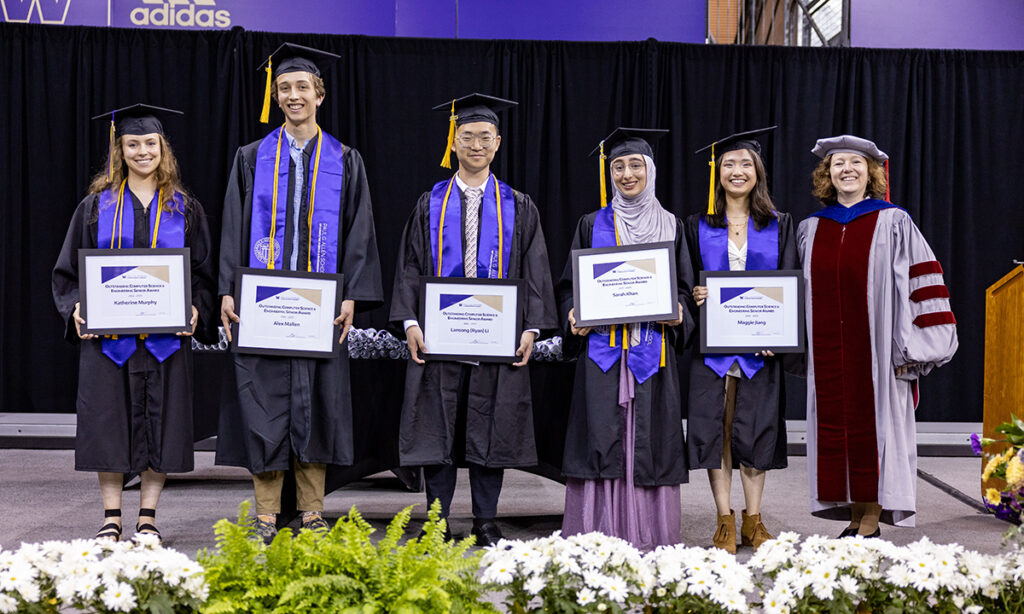
Maggie Jiang distinguished herself as an insightful and creative researcher in the Allen School’s Security and Privacy Research Lab who wasn’t afraid to ask questions about technology and scientific methodology. Operating at a level associated with experienced Ph.D. students, Jiang contributed to the publication of a longitudinal study of public opinion around the use of contact tracing apps to slow the spread of COVID-19 and concerns over individual privacy. She will continue on at the Allen School as a student in the combined B.S./M.S. program.
Sarah Khan was honored for her contributions as a teaching assistant for CSE Startup, a course for first-year students focused on problem solving, communication and computational thinking skills. In that role, Khan contributed to the development of curriculum for the Allen School Scholars Program and STARS with an emphasis on interdisciplinarity and the diversity of student experiences. Khan, who double-majored in computer science and education, communities and organizations, will continue her studies in the Allen School’s B.S./M.S. program.
Lansong (Ryan) Li was recognized for his remarkable contributions to interdisciplinary research projects bridging natural language processing and social computing. As a member of the Social Futures Lab, Li worked with UW and external collaborators to develop a harm-reduction framework for assessing and triaging misinformation online. He also explored how to leverage state-of-the-art neural network models to assess misinformation believability. Li will pursue a master’s degree at Stanford University following his graduation from the Allen School.
Alex Mallen is known as an ambitious and talented researcher with a passion for AI safety. As a member of the H2Lab, he spearheaded a project that sought to identify when large language models’ outputs can become untrustworthy — revealing his skills at building diagnostic datasets and running experiments in the process. Mallen, who is an active member of the grassroots research collective EleutherAI, previously earned a prestigious Goldwater Scholarship on his way to earning his undergraduate degree in just three years at the Allen School.
Katherine Murphy earned recognition as an outstanding leader as a teaching assistant for Software Design and Implementation for nine quarters. Having taken over the course software infrastructure when many experienced TAs were about to graduate, she worked with the rest of the teaching team to keep the course running smoothly and ensure continuity across multiple instructors and offerings. Although many of her contributions were behind the scenes, Murphy was responsible for the positive experiences many of her fellow graduates had in the course.
Best Senior Thesis Award
Each year, the school recognizes an undergraduate student for original research contributions through the Best Senior Thesis Award. The recipient of this award has completed an independent research project under the supervision of one or more faculty members culminating in a thesis presenting their results. The school received eight nominations this year, from which it selected one award winner and one honorable mention recipient.
Ximing Lu received the 2023 Best Senior Thesis Award for “The Art of Algorithm and Knowledge in the Era of Extreme-Scale Neural Models.” In her thesis, Lu demonstrated how to empower small to moderate sized neural language models to work competitively against industry-scale models. A prolific researcher working under the supervision of Yejin Choi, the Brett Helsel Career Development Professor in the Allen School and Senior Research Director at AI2, Lu has already published multiple papers in the preeminent venues for natural language processing. She is currently pursuing her Ph.D. at the Allen School.
Matt Deitke earned an honorable mention for his thesis, “Scaling Embodied Artificial Intelligence: Massive 3D Simulations to Real-World Distributional Robustness.” That work, which Deitke completed under the supervision of professor Ali Farhadi, explored ways to improve robots’ abilities to generalize to novel scenarios.
Undergraduate Service Awards
Since 2011, the Allen School has recognized graduating seniors who devoted their time and energy to building community and benefiting their fellow students through various events and activities throughout their time on campus. This year, the school recognized five outstanding graduates with Undergraduate Service Awards.
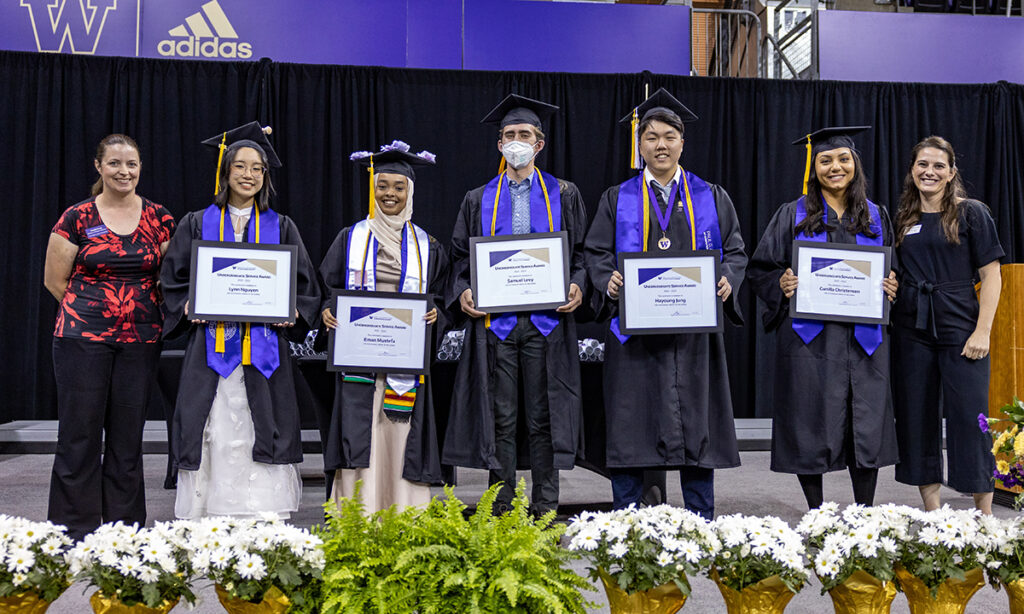
Camila Christensen (B.S., ‘22) has been “an amazing Allen School ambassador” — particularly to transfer students. Christensen served as a teaching assistant for the school’s transfer seminar, which supports newly arrived students to acclimate to the program, in addition to supporting various outreach efforts and serving as a frequent volunteer for Allen School events.
Described as “an incredible leader,” Hayoung Jung has been an engaged member of the student group Computing Community (COM^2) throughout his time on campus. He applied his leadership skills during the pandemic to analyzing and reporting on how COVID-19 was impacting his fellow students. Jung, who double-majored in computer science and political science, was recognized in the Husky 100 last year.
Samuel Levy has served as a developer for Impact++, a student group focused on the intersection of computing and social good, and as an Allen School peer adviser, assisting his fellow students with advice and resources. For the past year, Levy has served as a lead peer adviser and is known as “an exceptional leader, advocate, and student employee.”
Eman Mustefa co-founded GEN1, a student group focused on building community among Allen School students who are the first in their families to pursue a four-year degree. Passionate about supporting women of color in computing, Mustefa has also “generously stepped up, time and time again” to share her experiences with K-12 students as an Allen School Ambassador.
Earning a reputation as an “outreach and recruitment rockstar,” Lynn Nguyen volunteered for more high school visits and information sessions than any other member of the Allen School Ambassadors team. A community-minded leader who is exceptional at supporting students, Nguyen is also described as the glue that held various events and activities together.
A tip of the hat to great teaching
Bob Bandes Memorial Awards
Teaching assistants play a vital role in the Allen School’s educational mission, serving not only its own majors but also thousands more students across campus who enroll in computing courses. More than 750 students served as Allen school TA’s in 2022-2023, supporting student learning through office hours, tutoring and review sessions while assisting instructors with various course administration duties. As teaching professor Justin Hsia observed, “We could not do what we do without you.” During the annual graduation celebration, the school recognizes outstanding TA’s from the preceding academic year with the Bob Bandes Memorial Award for Excellence in Teaching. Out of over 700 total nominations spread out over 200 individual TA’s, the school selected three winners and three runners up who went above and beyond to provide a supportive student experience.
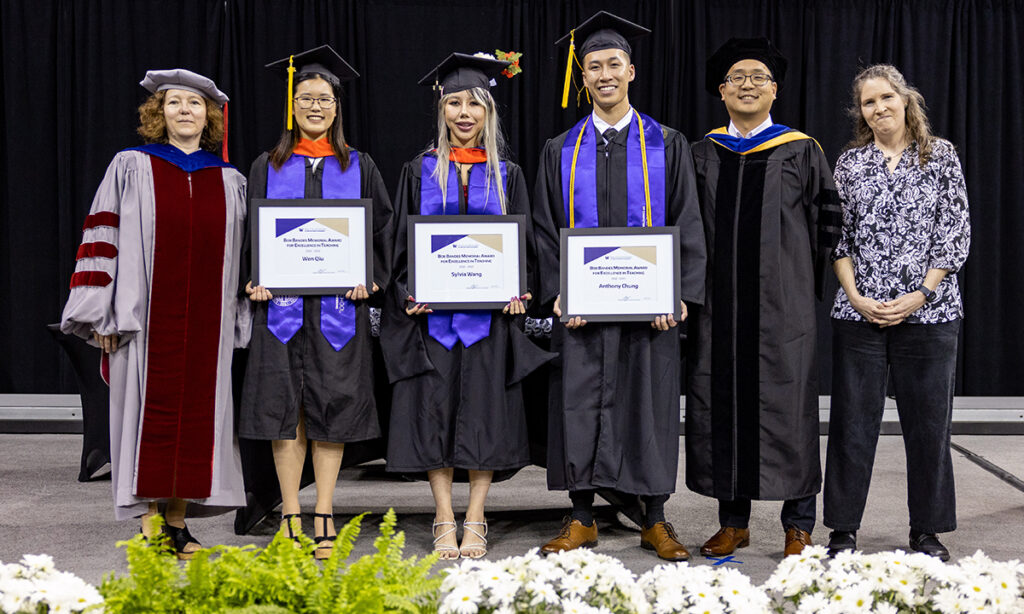
Winner Anthony Chung has supported six different courses over nine quarters as an undergraduate TA, including multiple courses in the Allen School’s Introduction to Computer Programming series, Data Structures and Algorithms, and Distributed Systems. Chung was lauded for his “clear intent to do right by all of his students” through his diligence in providing them with clear feedback and consistent grading. He was also proactive in identifying areas where students were struggling, offering solutions such as the creation of alternative visualizations to assigned problems and hosting one-on-one Zoom calls with students outside of office hours.
Fellow winner Wen Qiu has been a TA for 12 quarters, first as an undergraduate and then as a graduate student in the Allen School’s B.S./M.S. program, for Web Programming, Data Programming and Intermediate Data Programming. In addition, she served as the instructor for the latter course last summer. Known for her going to “tremendous lengths” to share her expertise not only with students in her courses but also her fellow TA’s, Qiu earned accolades for “seeing something needed to be done and jumping in and doing it.” One student nominator noted, “She would be an amazing professor!” Qiu also founded and served as president of the Association for Computing Education (ACE).
The final winner, Sylvia Wang, served as a TA or head TA for nine quarters across five different courses, including Intermediate Data Programming, Data Structures and Parallelism, Systems Programming and Database System Internals. Wang’s teaching style resonated with her students, who described her as kind, encouraging, supportive, patient and helpful. “She stays with each student until they understand the concepts they’re struggling with and does not let any student leave with any confusion.” She was also an excellent advocate for both students and other TA’s, including being proactive in identifying how an assignment that multiple students struggled with could be adjusted to improve the experience of everyone in the class.
Honorable mentions went to Melissa Lin, Sudheesh Singanamalla and Ben Zhang.
Lin, a student in the B.S./M.S. program, has served as a TA for eight quarters spanning the introductory series, Foundations of Computing I and II, and Data Structures and Algorithms and earning students’ appreciation for giving 110% to her students — even at 8:30 in the morning.
Singanamalla, a Ph.D. student, served as a TA for graduate-level courses in Computer Systems and Computer Security and Privacy, where his wisdom and compassion for students “shined brightly in all aspects of his work.”
Zhang, an undergraduate, TA’ed for multiple offerings of the Foundations of Computing series, earning plaudits for being thorough and proactive, making his sections “very welcoming and open” and responding to questions that seem ambiguous with examples generated from his own understanding.
Undergraduate Teaching Awards
Each year, student leaders in COM^2 — formerly the UW chapter of the Association for Computing Machinery — recognize selected faculty members for contributing to the Allen School’s educational mission and enriching the student experience through the Undergraduate Teaching Awards. This year, the group highlighted two professors for their role in “shaping our minds and inspiring our achievements.”
Andrea Coladangelo, a professor in the Allen School’s Cryptography and Theory of Computation groups, was honored for his first quarter of teaching. “He has worked tirelessly this quarter to build up the quantum computing course, expanding the frontiers of knowledge for his students,” COM^2 Chair Vidisha Gupta said.
“What distinguishes him, however, is his ability to discern the ‘real’ question behind the question.”
Known not only for his technical expertise but also for his kindness and generosity with his time, Coladangelo earned students’ admiration for his willingness to provide one-on-one help and to modify his teaching to better accommodate his class.
Teaching professor Ryan Maas (M.S.’18) was recognized for his impact that reaches far beyond the classroom.
Maas is known for his “captivating lectures” that make challenging concepts seem easy. But what truly sets him apart, Gupta noted, is his extraordinary care and dedication to his students.
“No question is too repetitive or silly for him, as he treats each inquiry with patience and thoughtfulness,” she said. “Ryan’s commitment to his students’ success extends beyond teaching, as he provides guidance and support to help them excel academically and grow as individuals.”
Congratulations to all of our Allen School graduates! And remember — our doors will always be open to you!


